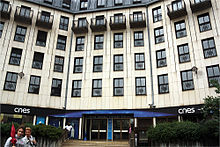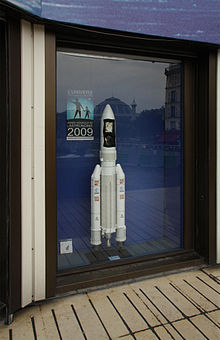- CNES
-
This article is about the space agency. For the Scottish council, see Comhairle nan Eilean Siar.
National Centre of Space Research
Centre National d'Études Spatiales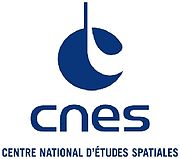
Owner France Established 1961 Headquarters Paris Administrator Yannick d'Escatha Budget €1,740 million (2007)[1] Website http://www.cnes.fr/ The Centre National d'Études Spatiales (CNES) is the French government space agency (administratively, a "public administration with industrial and commercial purpose"). Established under President Charles de Gaulle in 1961, its headquarters are located in central Paris and it is under the supervision of the French Ministries of Defence and Research. It operates out of the Guiana Space Centre, but also has payloads launched from space centres operated by other countries. CNES formerly was responsible for the training of French astronauts, but the last active CNES astronauts transferred to the European Space Agency in 2001.
Contents
CNES programs
CNES concentrates on five areas:[2]
- access to space
- civil applications of space
- sustainable development
- science and technology research
- security and defence
Access to space
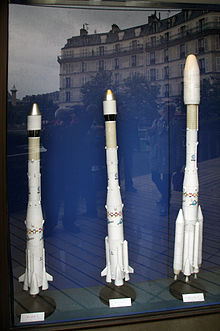 Ariane 1, 3 and 4 models in a CNES window
Ariane 1, 3 and 4 models in a CNES window
France was the third space power to achieve access to space, sharing technologies with Europe to develop the Ariane launcher family. Commercial competition in space is fierce, so launch services must be tailored to space operators’ needs. The new versions of Ariane 5 can launch large satellites or perform dual launches while the Vega and Soyuz-2 are small and medium-lift launchers.
Sustainable development
CNES and its partners in Europe—through the Global Monitoring for Environment and Security initiative (GMES)—and around the world have put in place satellites dedicated to observing the land, oceans and atmosphere, as well as to hazard and crisis management.
The best-known are the SPOT satellites flying the Vegetation instrument, the Topex/Poseidon and Jason-1 oceanography satellites, the Argos system, Envisat and—in the near future—Jason-2 and the Pleiades satellites.
Civil applications
CNES is taking part in the Galileo navigation programme alongside the European Union and ESA, and—in a wider international context—in the Cospas-Sarsat search-and-rescue system.
Security and defence
In addition to Spot and the future Pleiades satellites, CNES is working for the defence community as prime contractor for the Helios satellites.
GMES—a joint initiative involving the EU, ESA and national space agencies—pools space resources to monitor the environment and protect populations, but it also encompasses satellite support for armed forces and for European organisations on humanitarian or peacekeeping missions.
Ongoing missions
France’s contribution to the International Space Station is giving French scientists the opportunity to perform original experiments in microgravity. The CNES is currently studying formation flying, a technique whereby several satellites fly components of a much heavier and complex instrument in a tightly controlled configuration. CNES is collaborating with other space agencies in a number of projects. Orbital telescopes such as INTEGRAL, XMM-Newton and COROT, and space probes like Mars Express, Venus Express, Cassini-Huygens and Rosetta, operated by the European space agency are revolutionizing our knowledge of the Universe and our Solar System. Recent satellites such as Demeter (earthquakes). Joint missions with NASA result in PARASOL and CALIPSO (radiation budget) satellites. Megha-Tropiques Mission is a planned collaborative mission with the Indian Space Agency (ISRO) designed to study the water cycle and radiation dynamics, and assist observation from other satellite platforms. CNES plays a major role in the construction and operation of the Soil Moisture and Ocean Salinity satellite.
UFO Archive
Announcement
In December 2006, CNES announced that it would publish its UFO archive online by late January or mid-February. Most of the 6,000 reports have been filed by the public and airline professionals. Jacques Arnould, an official for the French Space Agency, said that the data had accumulated over a 30 year period and that they were often reported to the Gendarmerie.
In the last 2 decades of the 20th century, France was the only country with officially paid UFO investigators, employed by CNES's UFO section GEPAN, later known as SEPRA and now as GEIPAN.
Publication
On March 22, 2007, CNES released its UFO files to the public through its website. The 100,000 pages of witness testimony, photographs, film footage and audiotapes are an accumulation of over than 1,600 sightings since 1954 and will include all future UFO reports obtained by the agency, through its GEIPAN unit.
Skeptical critics
The French skeptics have heavily criticized the quality of the work done by the GEPAN, and show a lot of flaws in their methodologies. See (in French):
- Rossoni, D., Maillot, E., & Déguillaume, E. (2007). Les ovnis du CNES – 30 ans d’études officielles. (extracts from the book). Critical skeptical investigations of GEPAN's work.
Tracking stations
The CNES has several tracking stations. Partial list:[3][4]
- Kourou in French Guyana
- Issus Aussaguel, 20 km away from Toulouse
- Kerguelen Island, French Southern and Antarctic Lands
- Hartebeesthoek, South Africa
- Kiruna, Sweden for the SPOT program
History
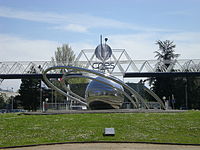 CNES facility in Toulouse
CNES facility in Toulouse
- 1961 CNES founded. Hammaguir missile range built in Algeria.
- 1962 Diamant Launch Vehicle introduced.
- 1962 First Berenice rocket launched.
- 1963 Cats launched into space via Véronique rockets.
- 1965 First French satellite put in orbit.[5]
- 1967 Hammaguir range closed.
- 1968 Toulouse Space Center completed.
- 1969 French Guiana Space Centre completed.
- 1973 Évry Space Centre completed.
References
- ^ "Le CNES en bref…". http://www.cnes.fr/web/CNES-en/7401-about-cnes.php. Retrieved 2010-04-18.
- ^ "About CNES". CNES. http://www.cnes.fr/web/CNES-en/3773-about-cnes.php.
- ^ "Les stations de contrôle". http://spot4.cnes.fr/spot4_fr/stat2ghz.htm. Retrieved 2008-06-22.
- ^ "Cnes - Fin de vie de SPOT 1". http://www.cnes.fr/web/1778-fin-de-vie-de-spot-1.php. Retrieved 2008-06-22.
- ^ http://www.univ-perp.fr/fuseurop/diaman_e.htm
External links
- CNES — Homepage (French)
- CNES — Homepage (English)
- CNES — UFO Data
Public sector space agencies Africa North AfricaSub-SaharanAmericas North AmericaSouth AmericaAsia East AsiaSoutheast AsiaSouth AsiaSouthwest AsiaCentral AsiaEurope Oceania World Categories:- Space agencies
- French space program
- UFO organizations
- Space centres
- Organizations established in 1961
- 1961 establishments in France
Wikimedia Foundation. 2010.

